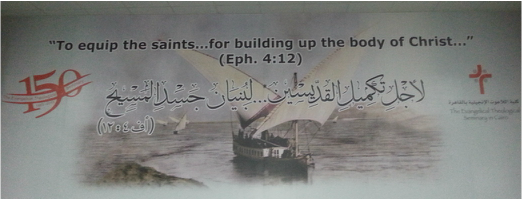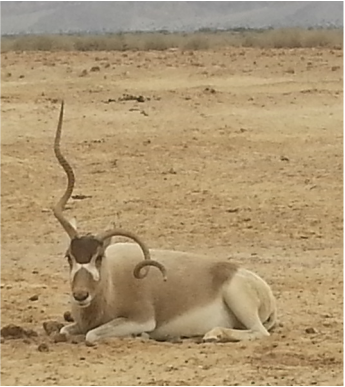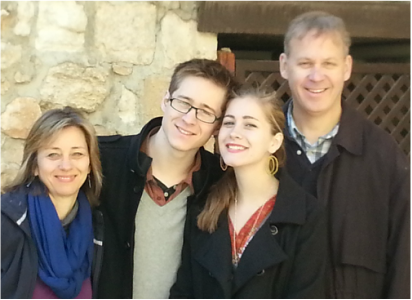 We’ve all heard plenty of bad news coming out of the Middle East/North Africa region the last few years, as some extremist groups have promulgated hatred. And the news out of Egypt has been hard for us in the US to interpret in the last four years. We don’t want to weigh in politically too much here, but we can report that in general Christians are very grateful for the leadership of their new president and there is real hopefulness that greater freedom and interfaith cooperation is coming to this land. We feel incredibly humbled to have seen and experienced all that we have been able to over the past week. Our caveat as we begin is that we are not journalists, nor are we long-term missionaries who have walked with the church here through its years of struggle and its recent years of revolution(s). We’ve tried to listen well but inevitably our perceptions are limited, and honestly even our internet is weak so we aren’t fact-checking every statistic you’ll see below. So if you are interested in what God is up to in Egypt, do read the links we’ll include here, to Egyptians who can tell the story much better than we can. Here are a few things that have given us cause for hope:
2 Comments
 Today felt like kind of a disaster. I (Lisa) should preface that by saying that, in between the more ministry-related endeavors of the past months and the coming ones, we have had two weeks of the kind of vacation many people would envy—time in the beautiful land of Israel with our children and with good friends, then a few more days as a pair seeing some extraordinary sights: Masada, an amazing wild animal reserve (check out the funky Oryxes and Addaxes here: http://en.wikipedia.org/wiki/Yotvata_Hai-Bar_Nature_Reserve), and the truly stunning wonders of Petra in Jordan. But lest your envy meter reads too high, let me just say that it’s called off-season for a reason: it was freezing at Petra, with winds kicking up so much red dust we had to close our eyes and stop walking at times. We got to our pleasantly off-season-priced hotel grateful for the adventure but exhausted from battling the elements all day. Then things really got weird. We weren’t primarily in Jordan to sightsee—we’d been looking forward to time with worshipping communities in Amman, so we were disappointed to Skype with our host that evening and hear him say, essentially, “Don’t come!” It was nothing personal; it was just that with the severe (and rare) series of snowstorms heading to Amman, he doubted we’d be able to navigate the city, which is understandably not equipped for clearing snow. He was almost certain all meetings this week would be cancelled. So, like wandering pilgrims, we headed south to Aqaba instead of north to Amman, worrying that our rental car was due in Amman, and wondering how we’d get to Egypt, our next stop, given that flights out of Amman were predicted to be cancelled for several days. Arriving in Aqaba, we turned down two indoor internet cafes as way too smoky, and resignedly settled for an essentially outdoor one, hunkering down on travel websites in our jackets just before the dusty windstorm really picked up. A long, frustrating search finally yielded reasonably priced tickets for tomorrow from Eilat, Israel, across the border from Aqaba, to Tel Aviv, to Istanbul, to Cairo. If that doesn’t sound like a direct route to you, congrats on your knowledge of geography! We applied some frequent flier miles and booked the flights. We turned in the rental car, grateful for their understanding and lack of penalty, got a Jordanian taxi to the pedestrian border, walked across, had our luggage turned inside out and tediously searched, got an Israeli taxi to our hotel, and are now figuring out housing and transportation in Egypt such that we aren’t too big of a burden to the seminary that was expecting us to arrive four days from now. All of which has me asking, “What are disasters for, anyway?” Well, one answer comes from basic narrative theory. In his delightful book, How to Write a Novel Using the Snowflake Method, Randy Ingermanson says that a good story must have, “big, horrible, hairy disasters.” Disasters do three things for a novel: they add excitement, they force decisions which reveal the true desires of main characters, and they send the story in a new direction. Don’t worry; I don’t actually think Rich and I have become characters in a book… but thinking about these principles helps me process the frustration of this day. I would add to Ingermanson’s list that disasters make characters tired. I’m exhausted! And hungry—though the dust storm that has turned the sky a reddish grey makes me really uneager to explore chilly Eilat in search of dinner. But, as Ingermanson promised, the day did reveal a desire. We really do want to get to Egypt. At one point in the lengthy search for tickets, Rich sighed and wondered aloud if we needed to cancel Egypt and lose it along with Amman. If we had to wait nearly a week in Aqaba for the flights to resume up in Amman, our time in Egypt would become so short as not to be worth it. So we opted to work hard to get there, and in fact get there early. Why? We aren’t really exploring a possible call to Egypt. We guess that we are too old to learn all that would be needed to minister effectively in such a vastly different setting. But we care about the suffering of that nation, we’re intrigued by signs of God doing new things there in and through all the turmoil of the last two years, and we’re interested in what it looks like to train leaders in that context. We’ve not connected much with ministries of our denomination yet, and this is one great opportunity to do so. We’ll be hosted by a Presbyterian-affiliated seminary there, the Evangelical Theological Seminary in Cairo, which is doing really exciting work in equipping the church for radical faithfulness in extremely challenging times. In fact, as I sit nestled under my blanket in a peaceful town in Israel, blessed to have had the technology and resources to able to shift gears so quickly, reading blog posts like this one http://www.layman.org/newsb95b (not brand new but still relevant and insightful) about the challenges Christians face in Egypt, I’m reminded that my minor disasters pale in comparison. And, while I mentioned that we haven’t become characters in a book in the Inkheart sense, I do believe that God is writing a good story through his people. And we’re glad and grateful to be two minor characters, looking for his hand in the twists and turns of the plot as it unfolds.  We are still in Israel as I write this, and it may be premature to draw conclusions about a visit to Israel that has a few days remaining. But our kids, who were with us for 10 days, left two days ago and our time is winding down. I do expect that this visit will remain with me, impacting how vividly I read the stories of Scripture. But beyond that, here are a few reflections I have had during our time here. 1. Repeatedly, we saw things that could have been the actual place where someone did something. (I know this observation sounds quite obvious as I say it, but bear with me please.)
2. In general, all over Israel we saw signs of a lull in tourism, which I'm sure was a hardship on all who rely on tourism for their livelihoods but made our visit more peaceful and focused. We were in Bethlehem on Christmas day, and it was quite crowded, but that was about the only time we were really inconvenienced by crowds. People here connected the drop in tourism with the Gaza war from the summer, yet we never felt unsafe or worried about our security. But we were able to enjoy many chance encounters with others who were striving to visit Israel, as we were, devotionally and not just as tourists.
3. We also took some time to visit the Yad Vashem, Israel's official monument to the victims of the Holocaust, at the heart of which is a museum that displays the history of Europe and Jews in Europe before and then during WWII. The architecture and layout of the monument and the narrative components, including first-person video interviews of survivors and documents telling of the lives of those who were lost, combined to make a very powerful experience. The message was not one of sheer numbers (6 Million lost their lives) but that each person who died had a family, a world, a history and a future and all of those families, worlds and futures were lost, each loss a tragedy in its own right. We came to this part of the world over the holidays for many reasons, but mostly to enjoy meaningful time with our kids and friends in a place that could be enriching of our spirits and souls. This we certainly received, and we did receive all of this trip as a precious once-in-a-lifetime gift of God to us. We begin 2015 excited about the year before us, and the changes and gifts that 2015 will bring that are currently unknown to us. |
Archives
April 2024
AuthorRich and Lisa Lamb Categories |
 RSS Feed
RSS Feed